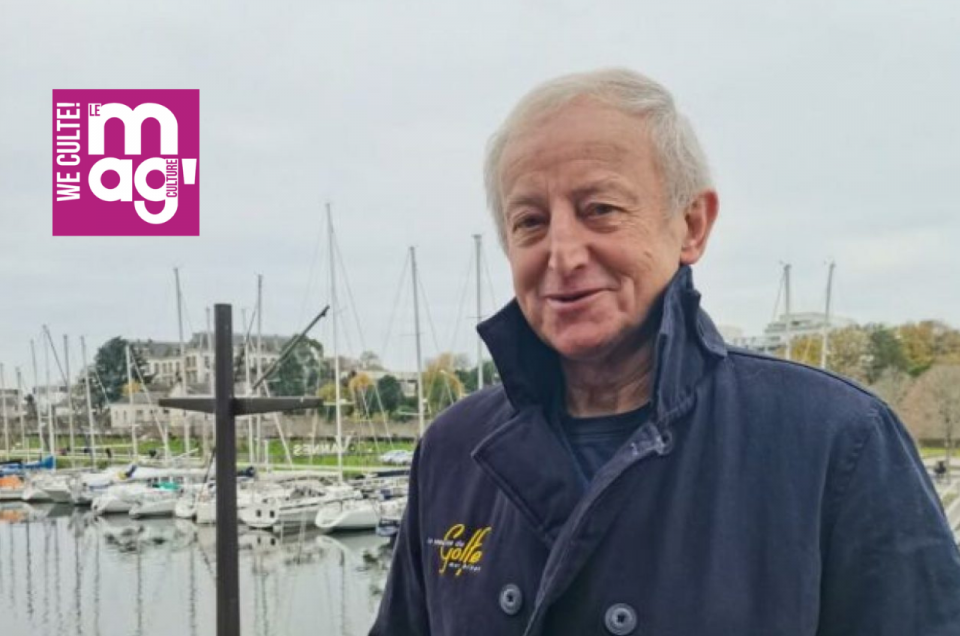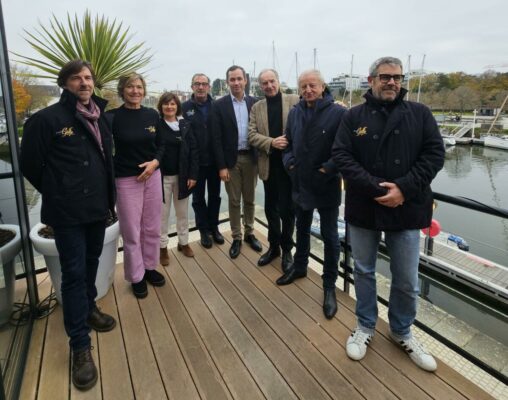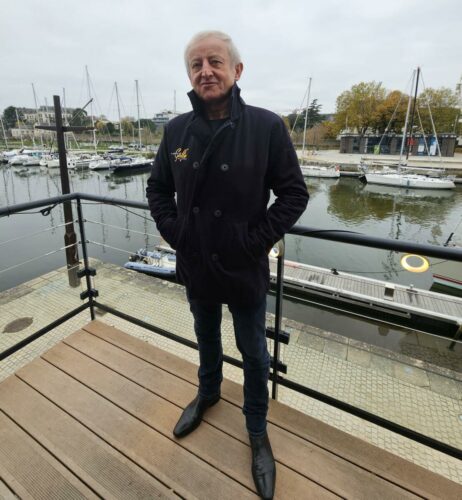
Press article | Yann Queffélec: ‘Believing in the sea is believing in life’ (We Culte)
Interview/Yann Queffélec. Winner of the 1985 Goncourt Prize for his novel Les Noces barbares, writer Yann Queffélec shares his unconditional love of Brittany and the ocean. For him, the sea is much more than a backdrop: it's a source of inspiration, a refuge, a lesson in humanity. For his first participation in the Semaine du Golfe, of which he will be the godfather alongside journalist Anne-Claire Coudray, he confides in us his childhood memories, his adventures with legendary sailor Éric Tabarly, his literary inspirations and his love for the Golfe du Morbihan, the jewel of Southern Brittany where this great maritime gathering will take place from May 26 to June 1, 2025.
You are the patron of the Semaine du Golfe du Morbihan 2025. What does this mean to you?
Yann Quéffélec: First of all, I'd like to salute the birth of the magnificent book “Balade en Morbihan” by my friend Patrick Mahé, in which he gives an extremely accurate description of this Gulf Week, which is a maritime celebration. I would add that it's also a Breton festival. I really like the notion of a Breton festival, because Bretons don't celebrate like other people.
There's music, Breton conviviality, family, youth - there are lots of children, which is also the hallmark of the Semaine du Golfe. All this makes this nautical event infinitely charming for me, because it highlights precisely this Brittany which honors family, friendship, which believes in mankind and which deploys an unforgettable humanism in these circumstances. It's my first time taking part, and I fully intend to sail! (laughs)
You've often talked about your passion for the sea and your connection with Brittany. Where does this attachment come from?
Yann Quéffélec: It's a family passion. I was born into an environment where the sea was loved and celebrated. I'm the son of writer Henri Queffélec, and I had uncles in my family who were yachtsmen at a time when that was relatively rare, even in Brittany.I saw two magnificent yachts on the Aber-Ildut river that belonged to my uncle André Chauvel, a tea planter in Vietnam. It was forbidden to mention these boats, let alone board them, until he returned to his native Brittany.
So my grandfather had to buy sailboats for his grandsons. Very early on, I had my feet on the deck of sailboats, but not just pretty pleasure sailboats. When I was a kid, I regularly went out on the water with the fishermen, and even with the Aber-Ildut seaweed gatherers. I used to go out with them to mow kelp, at a time when the relationship between children and adults in the harbours was very natural. It was then that I developed a passion for the sea, Brittany and the tides, whatever they were, in the moonlight. And that, of course, never wavered. Right up until the day when I wanted to sail around the world, but that never happened.
You sailed with the legendary Éric Tabarly. What did this experience teach you?
Yann Queffélec: I was lucky enough to sail in the area with him. I had been lent by the Jeunesse et Marine sailing school in Groix to Éric Tabarly, who was short of crew to prepare for his first transatlantic race in 1964. And there, at dawn, I found myself in the presence of this man who had tremendous charisma and simplicity. A man with all the qualities one might expect of masculinity, it seemed to me. He was attentive to others, had incredible muscular strength, and was kind to people who didn't know as much as he did. I was the one at the helm while he did all sorts of maneuvers. He prepared a noodle dish for me at lunchtime, onion noodles. It was his specialty. I've never eaten anything so good. To this day, if someone were to ask me what the best thing I've ever eaten on Earth was, it would have to be Tabarly's dish of onion noodles and corned beef! (laughs)
In your novels, the sea is often present, almost as a character in its own right. Why this literary fascination with the ocean?
Yann Queffélec: Firstly, because I'm not lucky enough like you to live by the sea. It's my breath, I carry it inside me, I can't do without it. Even when one of my novels is set in the Cévennes, as the last one was, I have the impression that it's an Atlantic breeze that drives my pen from one end to the other. The sea, in a ghostly way, is absolutely everywhere. In fact, I conjure up a sea breeze in this region. It does exist, except that it doesn't quite come from the Atlantic. But I don't feel like I don't live by the sea. That's the paradox. I have so many oceanic sensations, having done so much sailing...
Is the Golfe du Morbihan a good place to sail?
Yann Queffélec: In the old days, people didn't talk about the Breton riviera. We used to talk about the paradise of Southern Brittany. Compared to more northerly sailing, it's true that South Brittany is unheard of. The blue, the glaz (a shade of blue, green and grey) is not quite the same, nor is the color of the water. And then there's the gentle Ile-d'Houat, this absolutely incredible archipelago. It has the indefinable charm of the islands of southern Brittany, unlike any other.
Entering the Gulf of Morbihan by boat, Port-Navalo, the currents, that stroll from one leaning buoy to the next that you have to play with, anticipate your drift, get your tidal calculations right... All this makes sailing in the Gulf tricky but exciting.
Is there an island that is dear to your heart?
Yann Queffélec : For family reasons, the island of Hoedic. I went there with my mother when I was a kid, where she took us, much to the chagrin of my grandmother, who lived in North Brittany, in the Bay of Illdut, to show us how sweet South Brittany was. We were in Belle-Île, Hoedic and Houat, and it felt like we were arriving in the West Indies. Except that these West Indies were Breton West Indies, and it rained hard during our three days. And I spent most of my time sadly visiting the museum in the port of Le Palais, rather than the pedal-boat ride my mother had promised me along the beaches. But I still remember it with wonder.
What message would you like to pass on to visitors to the Semaine du Golfe 2025?
Yann Queffélec: To believe in the sea is to believe in life. That's really how I feel. When I start, not to despair, but to lament the spectacle of the world around me, I turn my eyes towards the Atlantic horizon and immediately, things get back in order in my head and I feel like smiling at life. I notice, for example, that my 6? year-old daughter, in first grade, is currently studying the Vendée Globe, in a town that has nothing to do with the sea. I find it extraordinary to think that a schoolteacher can get her pupils to work on the notion of the globe, geography, the ocean, pollution, etc.... based on her pupils' amazement at the Vendée Globe.
Sea pollution, climate change... are you sensitive to these issues?
Yann Queffélec: I'm by no means a technician when it comes to pollution, worsening or improving things. I can't imagine that the growing number of human beings is not dirtying the sea with their various behaviors around the world. I'm very attentive to what is wrongly called selective sorting, which is in fact subjective sorting. Selective sorting is an abominable pleonasm. But I'm not sure that our individual role, other than that of reassuring ourselves about our morality in the face of things, corrects anything about general pollution. When you look at the Chinese, the Indians, the Pakistanis, most of the African states, you realize that our purified thimble isn't much use. But we have to do it anyway, I'm convinced. It raises our awareness not only of pollution, but also of the general morality of all situations. You have to behave well towards the things in life.
Interview by Victor Hache - full article on We Culte
- Published on 22/11/2024





























